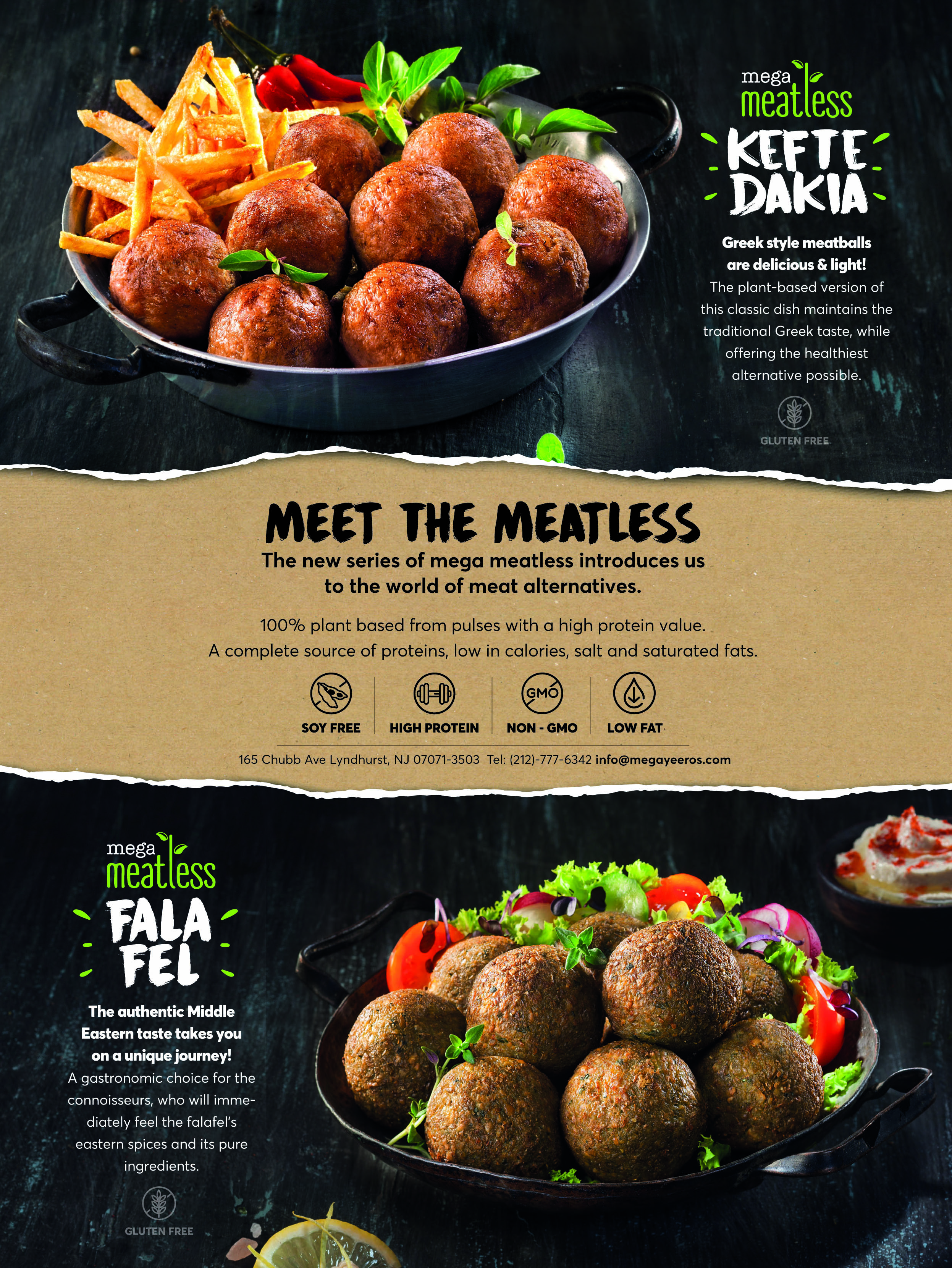A Greek New Way In The Windy
Posted by estiator at 9 July, at 10 : 14 AM Print
COVER STORY
Chicago welcomes “a flood” of modern Greek restaurants.
By Michael Kaminer
Chicago is home to more than 7,300 restaurants and the nation’s second-biggest Greek population after New York. Now it’s also the epicenter of a new wave of modern Greek cuisine.
In June, the Chicago Tribune reported on “a flood” of new Greek restaurants whose menus are show- casing “regionality”—the nuances in recipes, preparation, seasoning, provisions, and even plating found in different parts of Greece. On the list: buzzy newcomers like Andros Taverna, Lyra, and Kala, along with delivery/catering service Meze Table and pioneering hometown favorite Avli.
It’s a shift from the monolithic offerings that consumers have come to expect from traditional Greek restaurants—and it promises an exciting future for Greek chefs and restaurateurs as our cuisine continues to mainstream.
“The stereotype has been similar to red-sauce Italian in the U.S. in the 1960s and ’70s, a narrow lens of adaptation of classic recipes to the American palate,” says Doug Psaltis, the acclaimed chef who opened Andros Taverna in the Logan Square neighborhood last year. “Now, as people have traveled more and made healthful eating part of their lifestyles, they’re learning a lot more about our cuisine, like the food of the Northern Regions, the Peloponnese, and Macedonia. And there’s a lot more to go.”
Psaltis’ wife, celebrated pastry chef Hsing Chen, is a partner in the restaurant, which is inspired by “family and traditional recipes through a contemporary lens,” as he told the Tribune. Named one of Esquire’s best new restaurants of 2021, Andros showcases atypical fare like spicy lamb makaronia, kataifi cheese pie, and marousosalata, along with Psaltis’ refined, rustic takes on classics like eggplant moussaka, griddled halloumi, and “yiayia” dolmades from a cherished recipe.
Fish is flown directly from Athens, and swimmers like barbounia—red mullet—“are cooked in the traditional way, as you would find in tavernas throughout Greece. Our fish program is also unparalleled in Chicago, and I didn’t think that would be as well-received as it has,” says Psaltis, who grew up around his grandfather’s New York City diner. Likewise, the 100 percent Greek wine list has been a hit with customers. The wine list even delves into regional differences, and spotlights small Greek wineries. “Rarely has there been a Greek wine program presented with the same confidence and enthusiasm,” Psaltis says.
Even Psaltis’ choice of location makes a statement. “It’s notable that the restaurant won’t be located in Greektown in the West Loop neighborhood, which was once the commercial hub of Chicago’s Greek community,” wrote the Tribune. “But many of those restaurants, including icons like The Parthenon and Pegasus Restaurant and Taverna, have closed as rents increased and diners flocked to nearby dining destinations.”
Do diners get Psaltis’ back-to-the-future take on Greek food? “We’ve had to educate them a bit,” he says. “We weren’t sure what the boundaries would be. But we’ve developed more confidence as guests allow us to share foods of Greece that my wife and I had had a chance to learn and discover. We’re getting to reintroduce it the way you would see it in Athens.”
Veteran Chicago restaurateur Louie Alexakis has been pushing those boundaries for decades—and he’s grateful that Chicago is catching up to him. In 1995, Alexakis opened Ouzeri, the city’s first “Greek tapas” restaurant. After a hiatus from the business, he opened Avli in sub- urban Winnetka in 2009, focusing on creative and regional Greek cuisine.
Fast-forward to 2022: Avli has grown to six locations across Chicago, with a loyal following and ecstatic reviews. “The kitchen team makes a point of reflecting several regions in its cooking: meatballs from the ancient Greek city of Smyrna, honey cheese pie from Crete, feta shrimp from Piraeus, and a wild greens pie from Epirus, to name a few,” the Chicago Tribune wrote. “Consider that dedication to geographical detail all part of the team’s manifesto, one that puts an emphasis on meraki (doing something with heart and soul) and philoxenia (friendship toward strangers).”
Alexakis’ decision to open his own restaurant in the 1990s arose from his trips to Greece, “which I’ve visited every year of my life. I wanted to show consumers that Greek cuisine is interesting, and it’s different depending on where you’re cooking from,” he says. “It could be a cooking style from Crete, or Thessaloniki, or Volos, or even of the people who are Pontian and came to Greece in the 1900s.”
Avli “was the first to bring a new kind of Greek dining to Chicago,” Alexakis says. “The original Greek restaurants here were opened in Greektown by people who were pretty much from the same part of Greece. And the food reflected that: traditional dishes like moussaka, pastistio, and braised meats, mostly prepared in the same style.” To turn a page, Alexakis considered how to make his restaurant a more “contemporary Greek” experience—“from what kind of plate you put the food on to the cocktail and wine lists to the target market.” And, of course, he took the menu in unheard-of directions for Chicago.
No ethnic cuisine is static, Alexakis says, and nor should it be. “If you dined in Greece in the 2000s, they were not selling the same food as in the 1970s. Con- temporary techniques influence other cuisines. Diasporas abroad would change Greek cuisine. We shouldn’t ignore where we came from. My great-grandmother made the best pastitsio, and that’s a memory that should never leave. But if you believe there’s only one way to make a dish, you’re limiting yourself.”
Beth Salentiny, a partner in new food-delivery, catering, and takeout service Meze Table, agrees: “The approach for us isn’t the usual gyros and saganaki. It’s modern, but rooted in old traditions. We call it slow cooking.”
She and business partner Elizabeth Gartelos Morris, whose family has roots in the Peloponnese, weave in Athens street-food influences as well; the result is dishes like vegetarian moussaka, spanakopita with Bulgarian feta, and a colorful meze board of beef and pork meatballs with mint and parsley; ground beef-stuffed peppers in tomato sauce; chilled potato, garlic and lemon dip; and loads of seasonal vegetables, according to the Tribune. Dishes are meant to be shared, Salentiny says. “We can’t make food for four people. It has to be for forty,” she says, laughing. Meze Table aims to use locally sourced items, though ingredients like feta might come from Greece.
“This is a great time for Greek food in Chicago,” she says. “There’s no shortage of Greek food here, but these new places aren’t burgers-gyros- and-fries places. They’re very high-end. We’re excited that Greek food is in the spotlight.”















